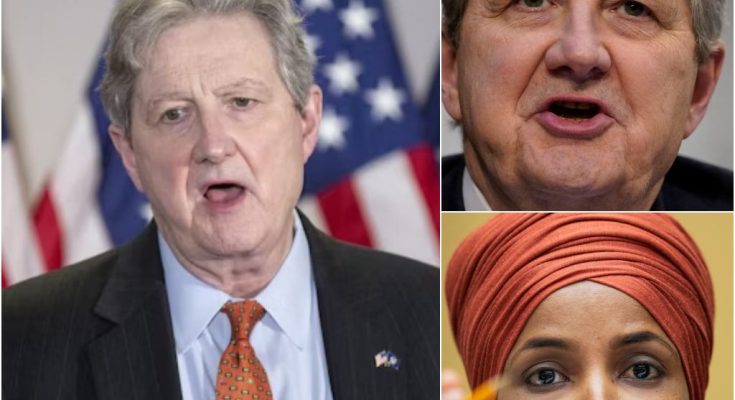A Routine Hearing That Exploded Into a Political Showdown
What was supposed to be another ordinary day in Washington turned into a political spectacle that has dominated headlines across the nation. The Senate Committee on Homeland Security and Governmental Affairs had convened to discuss immigration reform — a subject already polarizing enough on its own. But when Representative Ilhan Omar (D-MN), herself a Somali refugee turned U.S. congresswoman, took her seat, the session shifted from policy review to political theater.
Senator John Kennedy (R-LA), known for his sharp tongue and unflinching interrogation style, came armed not with soundbites but with a carefully curated stack of documents: past interviews, speeches, and social media posts from Omar herself. What happened next left the chamber frozen in silence and set off a firestorm of debate across America.
Kennedy’s Cold Precision
Kennedy began with an opening that was less about immigration policy and more about principle. “This isn’t just about border security or reform,” he said calmly, his voice carrying across the chamber without the need to rise. “This is about accountability. About the consistency of the message we give to the American people.”
From there, he launched into a sequence of pointed questions, each tethered to Omar’s own words. He highlighted instances where Omar had described the immigration system as “racist” while simultaneously calling for expanded access. He pressed her on how she could support broader reforms within a system she had condemned so harshly.
Omar attempted to redirect the conversation. “I am not here to be judged as an individual,” she responded firmly, “but to speak for the communities that have no voice.” Yet Kennedy did not relent. His methodical approach resembled a courtroom cross-examination more than a Senate hearing, each question narrowing the scope and cornering Omar further.
The Paper Trail That Changed the Tone
The tension escalated when Kennedy introduced documents into the record. These weren’t just notes or policy briefings — they were Omar’s own public statements spanning years. Tweets criticizing U.S. foreign policy. Speeches condemning aspects of American law enforcement. Interviews questioning the integrity of American institutions.
One by one, Kennedy read excerpts and asked Omar to reconcile them with her current positions. At one moment, he asked bluntly:
“If you once described America as oppressive, why then did you choose to serve in the very government you claim to oppose?”
The room grew still. Omar hesitated, choosing her words carefully, but the weight of the silence seemed louder than any possible answer.
The Question That Stopped Everything
As the session neared its close, Kennedy delivered a question that would reverberate across news cycles for days:
“If you weren’t Congresswoman Ilhan Omar, but simply an average immigrant with your exact background, do you believe you would have passed through the very immigration system you now defend?”
The question landed like a grenade. Omar paused, her silence stretching long enough to send a visible ripple of unease across the chamber. Reporters scribbled frantically. Cameras zoomed in. No rebuttal, no quip, no fiery counterattack followed. Just silence.
That silence, some argue, said more than any speech ever could.
Fallout and Reactions
Within hours, clips of the exchange spread like wildfire online. Supporters of Senator Kennedy praised the confrontation as a moment of truth-telling, applauding his effort to hold a high-profile lawmaker accountable for her words. “Finally, someone cut through the rhetoric,” one commentator declared on national television.
But Omar’s defenders saw the episode differently. To them, it was a targeted ambush designed to paint a refugee-turned-congresswoman as hypocritical, ignoring the broader nuances of immigration policy. Outside the hearing, activists rallied, calling Kennedy’s tactics “performative” and “disrespectful to immigrant communities.”
Political analysts noted the deeper implications: Kennedy’s approach reflected a broader strategy among Republicans to spotlight what they see as inconsistencies in progressive messaging. Meanwhile, Democrats warned that such confrontations risked reducing serious policy debates into moments of televised spectacle.
Accountability or Political Theater?
The larger question now looming over Washington is whether this exchange represented genuine accountability or a calculated political takedown. Was Kennedy exposing real contradictions, or was he leveraging Omar’s history for political gain in an already polarized environment?
Critics argue that the focus on Omar’s past statements distracted from the urgent immigration issues the hearing was meant to address: border management, asylum reform, and labor demands. Supporters counter that integrity and consistency in leadership cannot be separated from policymaking.
Either way, the event revealed just how personal and politically charged the immigration debate has become.
Lessons for Leaders
For elected officials like Omar, the hearing underscored the razor-thin line between personal history, public narrative, and political vulnerability. Symbolic representation — being both a refugee and a lawmaker — is powerful, but it can also be turned into a weapon by political opponents.
For Kennedy, the confrontation may bolster his profile among conservatives who value directness and accountability. His calm demeanor, reliance on documents, and refusal to grandstand may prove just as impactful as Omar’s silence.
Conclusion
What started as a straightforward Senate hearing on immigration ended as a defining political clash. Kennedy’s relentless questioning and Omar’s uncharacteristic silence created a moment that neither side will forget anytime soon.
For Omar, it was a reminder that past words will always resurface, especially in high-stakes debates. For Kennedy, it was proof that in politics, sometimes the most powerful weapon isn’t volume or theatrics — it’s precision.
And for the American people watching at home, the hearing was more than just an argument about immigration. It was a stark illustration of how fragile public trust can be, and how silence — in the right moment — can shake the foundations of a political narrative.



